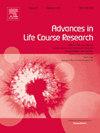Changes in women’s family trajectories in Mexico and Colombia
IF 3.4
2区 社会学
Q1 Medicine
引用次数: 0
Abstract
This study investigates the family trajectories of young women in Mexico and Colombia, analysing changes across three birth cohorts and examining the evolving relationship between educational attainment and family trajectories. Utilizing data from the Colombian Demographic and Health Survey (DHS) and the Mexican Encuesta Nacional de la Dinámica Demográfica (ENADID), the study encompasses retrospective partnership and childbearing histories for 45,683 women. Using sequence analysis and hierarchical clustering, we categorized family trajectories into five distinct clusters and employed multinomial logistic regression models to assess the association between family trajectories, birth cohort, and educational attainment. Our findings underscore a shift away from marriage and a rise in cohabitation in women’s family trajectories, coupled with an increase in complexity among younger cohorts, evident through more frequent separations and second-order unions. The study reveals that, despite evolving patterns, the predominant family trajectories within every cohort are characterized by stability, either in the form of marriage or cohabitation.
墨西哥和哥伦比亚妇女家庭轨迹的变化
本研究调查了墨西哥和哥伦比亚年轻女性的家庭轨迹,分析了三个出生队列的变化,并研究了受教育程度和家庭轨迹之间不断发展的关系。这项研究利用哥伦比亚人口与健康调查(DHS)和墨西哥国家调查Dinámica Demográfica (ENADID)的数据,对45,683名妇女的伴侣关系和生育史进行了回顾性调查。利用序列分析和层次聚类,我们将家庭轨迹分为五个不同的类,并采用多项逻辑回归模型来评估家庭轨迹、出生队列和受教育程度之间的关系。我们的研究结果强调了女性家庭轨迹的转变和同居的增加,以及年轻群体中复杂性的增加,从更频繁的分居和二次结合中可以看出。这项研究表明,尽管模式不断演变,但每一组人中主要的家庭轨迹的特点是稳定,要么是婚姻,要么是同居。
本文章由计算机程序翻译,如有差异,请以英文原文为准。
求助全文
约1分钟内获得全文
求助全文
来源期刊

Advances in Life Course Research
SOCIAL SCIENCES, INTERDISCIPLINARY-
CiteScore
6.10
自引率
2.90%
发文量
41
期刊介绍:
Advances in Life Course Research publishes articles dealing with various aspects of the human life course. Seeing life course research as an essentially interdisciplinary field of study, it invites and welcomes contributions from anthropology, biosocial science, demography, epidemiology and statistics, gerontology, economics, management and organisation science, policy studies, psychology, research methodology and sociology. Original empirical analyses, theoretical contributions, methodological studies and reviews accessible to a broad set of readers are welcome.
 求助内容:
求助内容: 应助结果提醒方式:
应助结果提醒方式:


